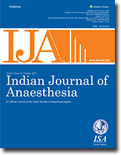
Indian Journal of Anaesthesia
Scope & Guideline
Transforming Knowledge into Practice in Anesthesia
Introduction
Aims and Scopes
- Clinical Anaesthesia Practices:
The journal emphasizes clinical studies that explore various anaesthesia techniques, including regional anaesthesia, sedation methods, and pain management strategies, ensuring practitioners stay updated with best practices. - Innovative Techniques and Technologies:
Research on new technologies in anaesthesia, such as ultrasound-guided techniques and advanced monitoring systems, is a core focus, aiming to enhance procedural safety and efficacy. - Patient Safety and Quality Improvement:
The journal prioritizes studies that assess and improve patient safety protocols, including the implementation of checklists and guidelines that minimize risks during anaesthetic procedures. - Education and Training in Anaesthesia:
Contributions that address anaesthesia education, training methodologies, and competency-based assessments are vital, helping to shape the future of anaesthesiology education. - Perioperative Care and Enhanced Recovery:
Research that focuses on perioperative care strategies, such as Enhanced Recovery After Surgery (ERAS) protocols, is significant, aiming to optimize patient outcomes and recovery times. - Epidemiology and Outcomes Research:
The journal encourages studies that examine the epidemiology of anaesthesia-related complications and outcomes, providing insights that can inform clinical practice and policy. - Research on Anaesthesia in Special Populations:
There is a strong emphasis on studies addressing anaesthesia practices in specific populations, including paediatric, geriatric, and patients with comorbid conditions, ensuring tailored approaches to diverse patient needs.
Trending and Emerging
- Artificial Intelligence and Technology in Anaesthesia:
An increasing number of studies are exploring the application of artificial intelligence and machine learning in anaesthesia, including predictive analytics for patient outcomes and operational efficiency. - Regional Anaesthesia Techniques:
There is a growing emphasis on regional anaesthesia, particularly new and innovative blocks, such as the erector spinae plane block, highlighting its importance in postoperative pain management. - Telemedicine and Remote Consultations:
Research on telemedicine in the context of anaesthesia has surged, particularly in response to the challenges posed by the COVID-19 pandemic, showcasing its role in preoperative assessments and follow-ups. - Enhanced Recovery After Surgery (ERAS) Protocols:
The focus on ERAS protocols has grown, reflecting a holistic approach to patient care that integrates anaesthesia with overall surgical recovery strategies. - Perioperative Risk Assessment and Management:
Emerging studies are increasingly focused on perioperative risk assessment tools, such as the NUTRIC score, to better predict and manage complications in high-risk surgical patients. - Patient-Centered Care and Satisfaction:
Research examining patient satisfaction and outcomes related to anaesthesia practices is gaining importance, as the emphasis on patient-centered approaches continues to rise. - Sustainability in Anaesthesia Practices:
There is a budding interest in exploring sustainable practices within anaesthesia, including the environmental impact of anaesthetic gases and waste management strategies.
Declining or Waning
- Traditional Anaesthesia Techniques:
There has been a noticeable decrease in publications focused on traditional anaesthesia techniques, such as basic inhalational anaesthesia, as newer methods and technologies gain prominence. - Case Reports:
The number of case reports has declined, possibly due to a shift towards more comprehensive studies and randomized controlled trials that provide broader insights rather than singular cases. - Basic Research in Anaesthetics:
Research concentrating solely on the pharmacology of anaesthetic agents without clinical applications is becoming less frequent, as the focus shifts to translational research that directly impacts clinical practices. - Manual Techniques in Anaesthesia:
There is a waning interest in manual anaesthesia techniques, such as traditional laryngoscopy, as the field increasingly adopts technology-driven solutions like video laryngoscopy. - Anaesthesia for Non-Surgical Procedures:
Publications regarding anaesthesia for non-surgical interventions, such as diagnostic procedures, seem to be decreasing, reflecting a trend towards focusing on surgical anaesthesia and critical care.
Similar Journals
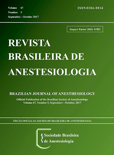
Brazilian Journal of Anesthesiology
Leading the way in evidence-based anesthesiology.The Brazilian Journal of Anesthesiology, published by Elsevier Science Inc, stands as a pivotal platform for disseminating innovative research in the fields of anesthesiology and pain medicine. With an Open Access policy established since 2013, this journal promotes the free exchange of knowledge, ensuring that practitioners, researchers, and students across the globe can easily access the latest advancements and evidence-based practices. Boasting an impressive categorization as Q2 in Anesthesiology and Pain Medicine and ranking #65 out of 136 in its category according to Scopus, the journal contributes significantly to the academic community, facilitating the convergence of varied scholarly perspectives from 1960 to 2024. Its commitment to advancing an understanding of anesthesia and pain management underscores its importance as a leading resource in the field, making it an essential read for anyone dedicated to enhancing patient care and outcomes.

Anaesthesiology Intensive Therapy
Unlocking Insights for Enhanced Clinical PracticesAnaesthesiology Intensive Therapy is a prestigious open-access journal published by TERMEDIA PUBLISHING HOUSE LTD, dedicated to advancing knowledge in the fields of anaesthesiology, critical care, and intensive medicine. Since its establishment in 2012, the journal has provided a vital platform for researchers, practitioners, and students to disseminate innovative findings, case studies, and reviews that contribute to the evolution of clinical practices and methodologies within these critical fields. With an impact factor that places it in the second quartile of its categories in Anesthesiology and Pain Medicine and Critical Care and Intensive Care Medicine, and a respectable ranking in the related areas, the journal has carved out a significant niche for itself in the global academic landscape. Accessible freely to all since its inception, Anaesthesiology Intensive Therapy facilitates unrestricted dissemination of research outputs, promoting collaborative exchanges and ensuring that contemporary advancements reach a broad audience of healthcare professionals. With its international scope and rigorous peer-review process, the journal stands as a beacon of quality scholarship, tirelessly working to enhance patient care and outcomes.
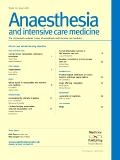
Anaesthesia and Intensive Care Medicine
Fostering Excellence in Anesthesiology and Intensive Medicine.Anaesthesia and Intensive Care Medicine, published by Elsevier, is a vital resource in the fields of anesthesiology and critical care, devoted to disseminating innovative research and advancements spanning from 2003 to 2024. With an ISSN of 1472-0299 and an E-ISSN of 1878-7584, this journal provides a platform for healthcare professionals, researchers, and students to engage with a diversity of topics, including pain management, anesthesia techniques, and intensive care protocols. Although it currently holds a category quartile ranking of Q4 in 2023 within both Anesthesiology and Critical Care disciplines, the journal continuously aims to enhance its impact and relevance in the academic community. The journal does not operate on an open-access model, ensuring that subscribers and institutions have exclusive access to high-quality, peer-reviewed research. With its focus on advancing clinical practices and fostering scientific dialogue, Anaesthesia and Intensive Care Medicine is essential for those looking to stay at the forefront of patient care and medical research.
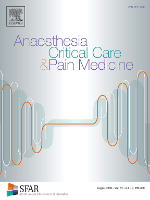
Anaesthesia Critical Care & Pain Medicine
Transforming Knowledge into Practice in Critical MedicineAnaesthesia Critical Care & Pain Medicine is a leading academic journal published by Elsevier France - Editions Scientifiques Medicales Elsevier, known for its commitment to advancing knowledge in the fields of Anesthesiology, Critical Care, and Pain Medicine. With an impressive impact factor reflected by its Q1 rankings in pivotal categories such as Anesthesiology and Pain Medicine, and Critical Care and Intensive Care Medicine, this journal stands out for its rigorous peer-reviewed articles and innovative research contributions. Established in 2015, it provides a critical platform for international scholars and practitioners to disseminate their findings and engage with contemporary challenges in acute and pain management, ultimately improving patient care globally. With open access options available, the journal ensures that its significant research is accessible to a broader audience, encouraging collaboration and knowledge sharing within this vital field of medicine. For those at the forefront of medical practice, Anaesthesia Critical Care & Pain Medicine serves as an invaluable resource for ongoing education and professional development.

Current Anesthesiology Reports
Pioneering Insights for Modern Anesthesia PracticeCurrent Anesthesiology Reports is a prominent journal published by Springer Nature, dedicated to advancing the field of anesthesiology and pain medicine. With a focus on the latest clinical and research developments, this journal serves as a vital resource for researchers, clinicians, and students alike. As of 2023, it holds a respectable Q2 quartile ranking in its category, highlighting its impact and relevance within the discipline, while also ranking 59th out of 136 in Scopus, placing it in the 56th percentile for anesthesiology and pain medicine. The journal is indexed with the E-ISSN 2167-6275 and offers an open-access model that enhances visibility and accessibility of knowledge across the global medical community. Spanning research from 2013 to 2024, Current Anesthesiology Reports aims to contribute significantly to the understanding and practice of anesthesiology, reflecting the rapidly evolving landscape of the discipline.
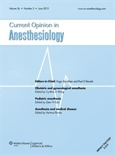
Current Opinion in Anesthesiology
Navigating the Latest Trends in Anesthesia and Pain ManagementCurrent Opinion in Anesthesiology, published by LIPPINCOTT WILLIAMS & WILKINS, is a leading journal that offers critical insights and contemporary perspectives in the field of anesthesiology and pain medicine. With an ISSN of 0952-7907 and E-ISSN of 1473-6500, this journal has established itself as an influential platform since its inception in 1994, reaching its convergence in 2024. Recognized in the 2023 category quartiles as Q2 and securing an impressive rank of #37 out of 136 in Scopus, it operates at the forefront of its discipline, engaging a diverse audience of researchers, clinicians, and students. The journal aims to synthesize the latest advances and foster dialogue on emerging topics, ensuring that practitioners are equipped with the best evidence-based approaches to patient care. While it is not an open-access publication, its rigorous editorial process and commitment to quality make it a valuable resource for professionals passionate about enhancing their knowledge and practice in anesthesiology.

Journal of Anesthesia
Advancing Anesthesia: Insights for the Future of Pain ManagementJournal of Anesthesia, published by SPRINGER JAPAN KK, is a leading peer-reviewed journal dedicated to advancing the field of anesthesiology and pain medicine. With an ISSN of 0913-8668 and an E-ISSN of 1438-8359, the journal features high-quality research articles, reviews, and clinical studies that encompass both the scientific and practical aspects of anesthesia. Situated in Japan and categorized within the Q2 quartile for Anesthesiology and Pain Medicine, it holds a commendable rank of #33 out of 136 in Scopus, placing it in the top 24% of its category. The impact factor is under continuous evaluation, reflecting the journal's commitment to innovative research contributions. Published annually since its inception in 1987 and continuing through 2024, the journal provides crucial insights and discussions pertinent to the contemporary challenges faced in medicine. While it offers traditional subscription services, its significance in the realm of anesthesiology makes it a vital resource for researchers, professionals, and students seeking to explore the latest advancements and practices in the discipline.
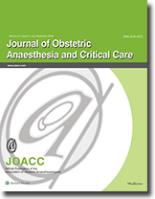
Journal of Obstetric Anaesthesia and Critical Care
Elevating standards in anaesthetic care for mothers and infants.Journal of Obstetric Anaesthesia and Critical Care, published by Wolters Kluwer Medknow Publications, is a premier Open Access journal dedicated to the field of obstetric anaesthesia and critical care medicine. Since its inception in 2011, this journal has become a vital resource for researchers, clinicians, and students, offering a platform for the dissemination of cutting-edge research, reviews, and innovative practices that enhance the safety and efficacy of obstetric anaesthetic care. With an ISSN of 2249-4472 and an E-ISSN of 2249-9539, the journal provides unrestricted access to its published content, promoting knowledge sharing across the global medical community. Readers can expect articles covering a wide range of topics, including but not limited to, regional anaesthesia techniques, patient safety protocols, and perioperative management in obstetric patients. The Journal of Obstetric Anaesthesia and Critical Care holds significant value in its field, contributing to improved patient outcomes and advancing the scope of anaesthetic practice.
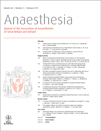
ANAESTHESIA
Pioneering Pain Management: Insights from the Leaders in AnesthesiologyANAESTHESIA is a premier peer-reviewed journal published by WILEY, dedicated to advancing the field of anesthesiology and pain medicine. With a rich history dating back to 1947, this journal has established itself as a vital resource for academics and practitioners, reflected in its esteemed Q1 category ranking in Anesthesiology and Pain Medicine for 2023. Recognized for its high-impact research, ANAESTHESIA holds the distinction of being ranked #1 out of 136 in Scopus within its specialty, placing it in the 99th percentile of medical journals. Though it does not offer Open Access, it provides an essential platform for discussing innovative techniques, clinical practices, and important advancements in anesthetic science, ultimately enhancing patient care and safety. With its commitment to excellence, ANAESTHESIA is a must-read for researchers, clinicians, and students seeking to remain at the forefront of anesthesia and pain management developments.

ACTA ANAESTHESIOLOGICA BELGICA
Empowering Anesthesiology: Where Research Meets RealityACTA ANAESTHESIOLOGICA BELGICA, ISSN 0001-5164, is a prestigious academic journal published by ACTA MEDICAL BELGICA, dedicated to the field of anesthesiology and pain medicine. Established in the 1950s, this journal has continued to serve as a vital platform for disseminating innovative research and evidence-based practices within the discipline. Though currently positioned in the Q4 quartile in both Anesthesiology and Pain Medicine categories, it still plays a significant role in advancing knowledge and bridging gaps related to anesthesia techniques, outcomes, and patient safety. The journal is available in both print and electronic formats, with an E-ISSN of 2736-5239. Operating from Brussels, Belgium, ACTA ANAESTHESIOLOGICA BELGICA fosters an inclusive community of researchers, clinicians, and students, all dedicated to enhancing patient care and safety through the sharing of impactful findings and clinical insights.